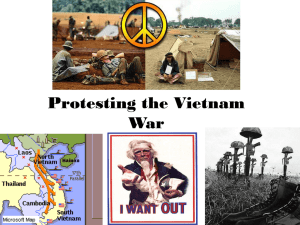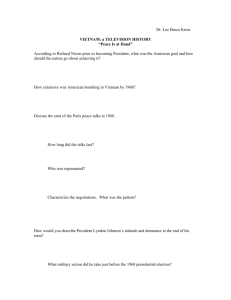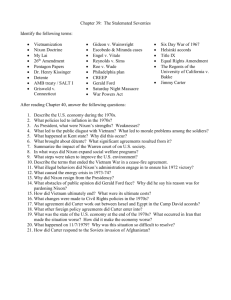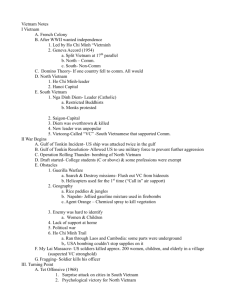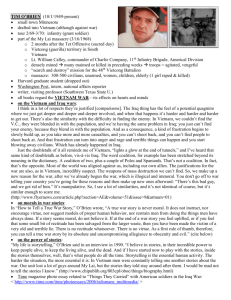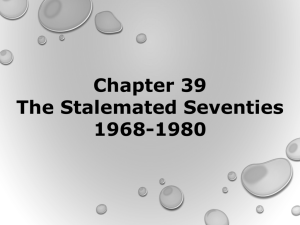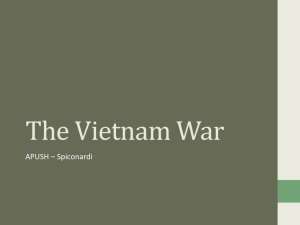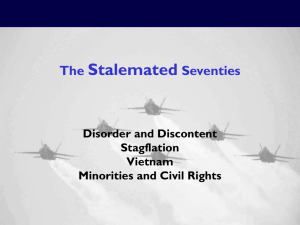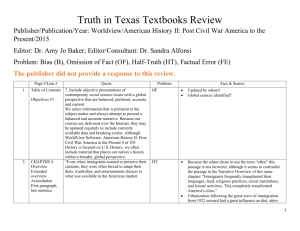22 IMPORTANT EVENTS AND PEOPLE IN 20TH AND 21ST
advertisement
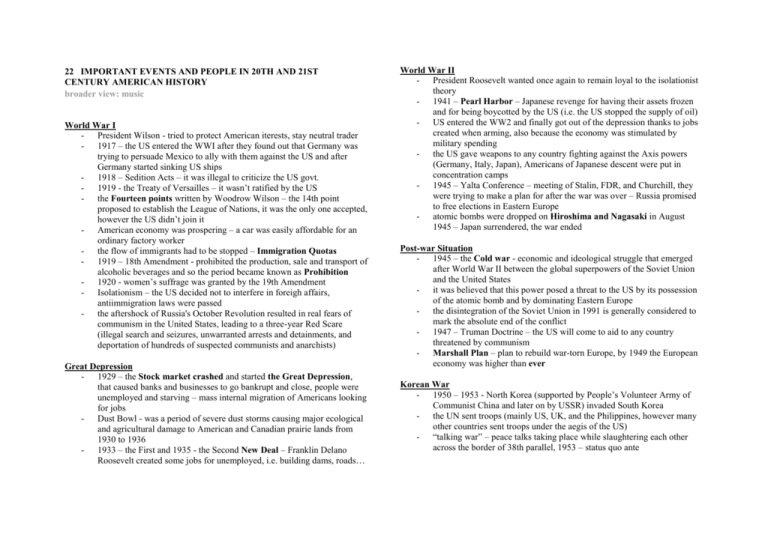
22 IMPORTANT EVENTS AND PEOPLE IN 20TH AND 21ST CENTURY AMERICAN HISTORY broader view: music World War I - President Wilson - tried to protect American iterests, stay neutral trader - 1917 – the US entered the WWI after they found out that Germany was trying to persuade Mexico to ally with them against the US and after Germany started sinking US ships - 1918 – Sedition Acts – it was illegal to criticize the US govt. - 1919 - the Treaty of Versailles – it wasn’t ratified by the US - the Fourteen points written by Woodrow Wilson – the 14th point proposed to establish the League of Nations, it was the only one accepted, however the US didn’t join it - American economy was prospering – a car was easily affordable for an ordinary factory worker - the flow of immigrants had to be stopped – Immigration Quotas - 1919 – 18th Amendment - prohibited the production, sale and transport of alcoholic beverages and so the period became known as Prohibition - 1920 - women’s suffrage was granted by the 19th Amendment - Isolationism – the US decided not to interfere in foreigh affairs, antiimmigration laws were passed - the aftershock of Russia's October Revolution resulted in real fears of communism in the United States, leading to a three-year Red Scare (illegal search and seizures, unwarranted arrests and detainments, and deportation of hundreds of suspected communists and anarchists) Great Depression - 1929 – the Stock market crashed and started the Great Depression, that caused banks and businesses to go bankrupt and close, people were unemployed and starving – mass internal migration of Americans looking for jobs - Dust Bowl - was a period of severe dust storms causing major ecological and agricultural damage to American and Canadian prairie lands from 1930 to 1936 - 1933 – the First and 1935 - the Second New Deal – Franklin Delano Roosevelt created some jobs for unemployed, i.e. building dams, roads… World War II - President Roosevelt wanted once again to remain loyal to the isolationist theory - 1941 – Pearl Harbor – Japanese revenge for having their assets frozen and for being boycotted by the US (i.e. the US stopped the supply of oil) - US entered the WW2 and finally got out of the depression thanks to jobs created when arming, also because the economy was stimulated by military spending - the US gave weapons to any country fighting against the Axis powers (Germany, Italy, Japan), Americans of Japanese descent were put in concentration camps - 1945 – Yalta Conference – meeting of Stalin, FDR, and Churchill, they were trying to make a plan for after the war was over – Russia promised to free elections in Eastern Europe - atomic bombs were dropped on Hiroshima and Nagasaki in August 1945 – Japan surrendered, the war ended Post-war Situation - 1945 – the Cold war - economic and ideological struggle that emerged after World War II between the global superpowers of the Soviet Union and the United States - it was believed that this power posed a threat to the US by its possession of the atomic bomb and by dominating Eastern Europe - the disintegration of the Soviet Union in 1991 is generally considered to mark the absolute end of the conflict - 1947 – Truman Doctrine – the US will come to aid to any country threatened by communism - Marshall Plan – plan to rebuild war-torn Europe, by 1949 the European economy was higher than ever Korean War - 1950 – 1953 - North Korea (supported by People’s Volunteer Army of Communist China and later on by USSR) invaded South Korea - the UN sent troops (mainly US, UK, and the Philippines, however many other countries sent troops under the aegis of the US) - “talking war” – peace talks taking place while slaughtering each other across the border of 38th parallel, 1953 – status quo ante Civil Rights Movement (1945–1964) - protests against racial segregation and discrimination mainly after the WWII because African-Americans were denied the civil and human rights they fought for in the war - during the 1960s, the Jim Crow laws that legalized racial segregation between Whites and Blacks came to an end. - March 1963 - Washington – Martin Luther King gave his famous speech “I Have a Dream” - 1964 – Civil Rights Act – introduced by Kennedy, after his assassination it was pushed through Congress by Johnson; it outlawed discrimination based on race, color, creed, or sex - 1965 – Voting Rights Act – outlawed discrimination in voting - Vietnam War - 1954 – the Frenchmen got kicked out of Vietnam, according to Geneva Accords Vietnam was divided by the 17th parallel - civil war broke out in the South of Vietnam - Army of Republic of Vietnam (supported by US) vs. National Front of Liberation (=Vietcong, communists) - 1965 – the US wanted to prevent Vietnam from becoming a communist country, so Lyndon Johnson sent in troops - 1968 – Tet offensive – Vietcong took over Vietnam almost completely - Nixon was elected – he escalated the war, however it was obvious that US couldn’t win - the plan was to withdraw the troops gradually but the soldiers were angry so Nixon decided to invade Laos and Cambodia instead - 1973 – Nixon finally withdrew the troops and Vietnam went officially communist - From the 70s to the present - 1972 - Watergate – it was an office building in Washington DC, where the Democratic party had their headquarters, 5 people broke in there and got caught – some of them were from CIA - Nixon was trying to cover it up and ordered FBI not to investigate it, secret tapes of Nixon saying that CIA should obstruct the investigation were discovered in the White House - 1974 – Nixon resigned - - - - - - - - 1987 – Iran-Contra Scandal – Reagan was selling weapons to Iran to have hostages released while supporting Iraq against them; also the US armed Nicaraguan communists in Honduras to reinvade their country 1991 – Persian Gulf War – Iraq invaded Kuwait, the UN troops (which were comprised mostly of US soldiers) defeated Iraqui army led by Saddam Hussain 1993 - Ramzi Yousef, a Kuwaiti national, planted explosives in the underground garage of One World Trade Center and detonated them killing six people and injuring thousands, in what would become the beginning of an age of terrorism 1995 – Oklahoma city bombing - Timothy McVeigh spearheaded a terrorist bombing of the Alfred P. Murrah Federal Building in Oklahoma City, the bombing killed 168 people and injured over 800 2001 – September 11th terrorist attacks - extremists hijacked four transcontinental airliners and intentionally crashed two of them into the twin towers at the World Trade Center and one into the Pentagon. The passengers on the fourth plane (was intended to hit the US Capitol Building in Washington) revolted causing the plane to crash into a field in Somerset County, PA - terrorist group, al-Qaeda, spearheaded by Osama bin Laden, is responsible for the attacks War on Terrorism - in response to the attacks, President George W. Bush, United States invaded Afghanistan - overthrew the Taliban regime (which had supported and harbored bin Laden) invaded Iraq - overthrowing and capturing Saddam Hussein in 2003 reasons: "spreading of democracy", the "elimination of weapons of mass destruction" (later proven to be based on false evidence) and the "liberation of the Iraqi people" this second invasion proved to be unpopular in many parts of the world and helped fuel a global wave of anti-American sentiment. 2005 - Hurricane Katrina flooded parts of the city of New Orleans and heavily damaged other areas of the gulf coast as of 2008, the political climate remains polarized as debates continue over partial birth abortion, gun control, same-sex marriage, immigration reform, and the ongoing war in Iraq. In the area of foreign policy, the U.S. maintains ongoing talks with North Korea over its nuclear weapons program, as well as with Israel and the Palestinian Authority over a twostate solution to the Israeli-Palestinian conflict. The George W. Bush administration has also stepped up rhetoric implicating Iran and more recently Syria in the development of weapons of mass destruction.

